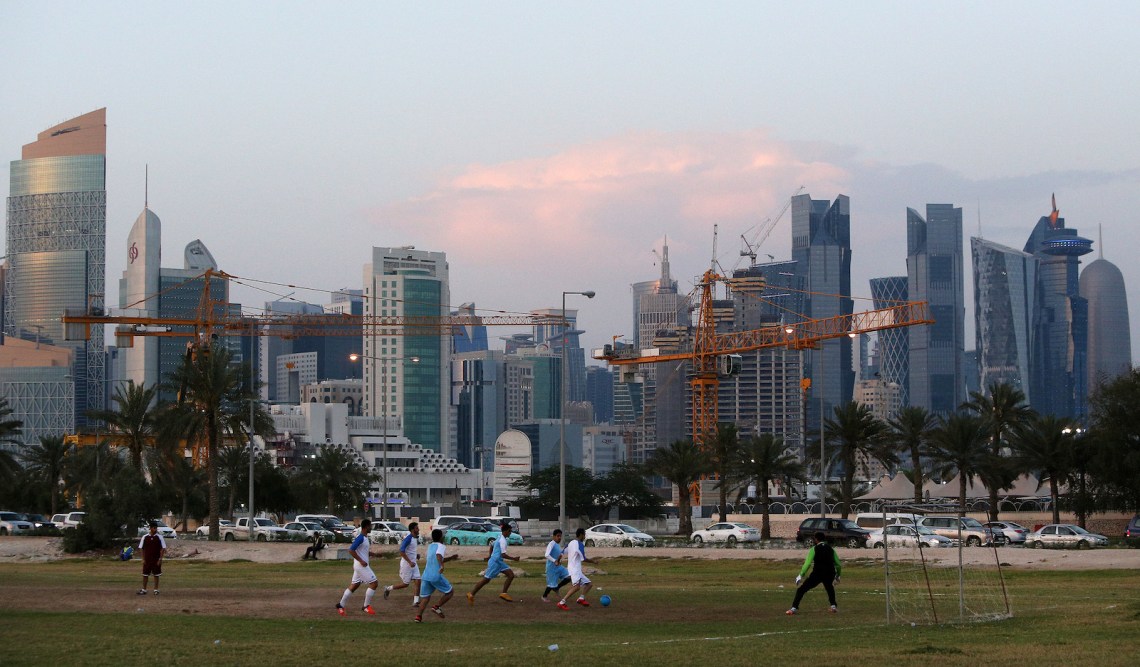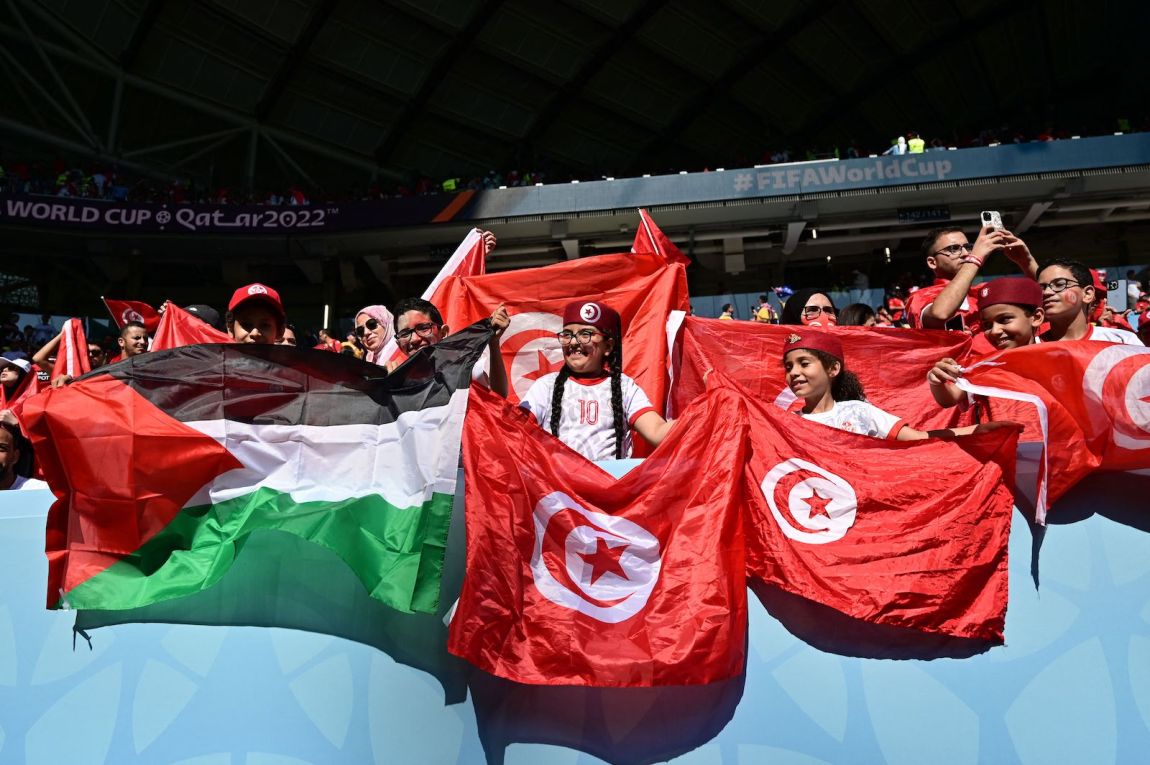The current World Cup, the first ever hosted by an Arab country, has offered moments of wonder and jubilation to fans in the region, some of the most passionate in the world. It has also provoked commentary, to a degree that some have considered biased, on the human rights record of its host, Qatar. The cup has brought the small, wealthy emirate the global showcase it spent a fortune pursuing—as well as more scrutiny than it may have bargained for.
As I write this on December 7, the Qatari team has been eliminated after scoring only a single goal. But other teams from the region have had reason to celebrate. Saudi Arabia’s 2–1 opening win over Argentina was a historic upset and a thrill to the kingdom, which declared the day after its victory a national holiday. Morocco’s 2–0 win against Belgium and Tunisia’s 1–0 against France both beat the odds too. After defeating Spain in a game that went to penalty kicks, Morocco has advanced to the quarterfinals; it is only the fourth African country and the first Arab one to get this far in the cup’s history.
Each victory by a Middle Eastern or North African team was celebrated across countries that are otherwise often at odds. Videos circulated online showing audiences celebrating each goal, including Saudi fans who in their enthusiasm shot guns in the air and took a door off its hinges. In Dubai, the Burj Khalifa was lit up with the colors of the Saudi and Moroccan flags. The cup has provided the occasion for a thawing in relations between Qatar and its neighbors Saudi Arabia and the United Arab Emirates (UAE), which from 2017 to 2021 had put the emirate under a politically motivated blockade. The Emir of Qatar briefly draped himself in a Saudi flag during the team’s game, and the president of the UAE paid his first visit to the nation since the breakdown in diplomatic relations.
Ever since 2010, when Qatar won the bid to host the cup (beating out the United States, South Korea, Japan, and Australia), the decision has been controversial. The country has come under criticism for laws that discriminate against women and LGBTQ people and for its racialized, exploitative labor system. About 90 percent of Qatar’s residents are foreigners. They range from well-paid Western consultants to middle-class professionals from other Arab countries to construction workers and maids from South Asia, Southeast Asia, and Africa. The nationalities that are recruited into white-collar jobs are given better pay, legal protections, and dignity. The workers at the bottom of this labor pyramid, meanwhile, face fraud, abuse, wage theft, and grueling conditions.
The cup had to be scheduled for winter rather than summer, to avoid Doha’s 108-degree heat, and Qatar has spent at least $220 billion building stadiums and infrastructure for the games. This construction was undertaken by a portion of the country’s approximately one million migrant construction workers, who comprise nearly half of its foreign workforce. Since 2010, The Guardian has reported, “more than 6,500 migrant workers from India, Pakistan, Nepal, Bangladesh and Sri Lanka have died” in the country. Qatar says that most of these were natural deaths. Until recently it only acknowledged forty deaths at World Cup sites, but a Qatari official has updated the figure to between four and five hundred. Human rights groups like Amnesty International and Human Rights Watch say that the Qatari authorities routinely classify the deaths of migrant workers as natural rather than work-related, even when they are likely due to work conditions and extreme heat.
Partly due to international pressure, Qatar has implemented some labor reforms, abolishing the kafala system—in which workers were controlled by a local sponsor whose permission they needed to change jobs or leave the country—and instituting a minimum wage. But critics say the reforms were limited, tardy, and weakly enforced. Qatari officials have insisted that they should be commended for the reforms and dismissed calls for a remedy fund—which would pay $440 million, the same amount as the World Cup prize, to workers for stolen wages, injuries, and deaths—as “a publicity stunt.” And yet they are clearly uncomfortable with the topic, hiding a mural they had themselves commissioned to celebrate the contribution of migrant workers to the games.
Despite having twelve years to prepare, Qatar has seemed taken off-guard by some of the consequences of hosting the world media and 1.2 million visitors. The tension between the country’s desire to portray itself as open and tolerant and the realities on the ground could not help making itself felt. The consternation caused by a last-minute decision to ban alcohol sales inside stadiums was more amusing than anything else—it is worth noting that alcohol is being served elsewhere in the emirate and that it is also banned, for health and safety reasons, in stadiums in France. More seriously, Qatari officials said that all were welcome to attend the cup but then cracked down on any displays of the rainbow flag. One overzealous guard even reportedly detained Brazilian fans carrying the flag of Pernambuco, a region of Brazil, which happens to feature a rainbow.
Advertisement
It was no use for FIFA president Gianni Infantino to disingenuously urge teams and fans to “focus on the football.” (He also declared, surreally, that “today I feel Qatari. Today I feel Arab. Today I feel African. Today I feel gay. Today I feel disabled. Today I feel a migrant worker.” Later he explained that he understood discrimination because he had experienced bullying as a red-headed child with freckles.) In fact, part of the criticism of Qatar is directed at FIFA’s own well-documented corruption. “About a dozen of the FIFA officials involved” in selecting Qatar as host, NPR noted last month, “have since received bans from the organization…or been indicted over allegations of corruption.” Former French president Nicolas Sarkozy and soccer legend Michel Platini have both been implicated in reportedly supporting the Qatari bid as part of a backroom deal. In 2020 the US Department of Justice alleged that Russia—the host of the last games—and Qatar won their bids by offering million-dollar bribes. (Qatar and Russia both denied the charges.)
Several European teams that had intended to wear “One Love” armbands in support of LGBTQ rights decided not to once they were told by FIFA officials that doing so would earn them a yellow card. (The organizations’ rules prohibit displaying religious or political slogans.) German players posed before their game with their hands over their mouths to protest FIFA’s censorship. Observers in this part of the world were quick to point out that Palestinian voices are increasingly being censored in Germany.
It is never hard to find examples of such hypocrisy. Western governments and businesses have shown a great willingness—even eagerness—to deal not only with Qatar but with other Gulf and Arab countries that have even worse human rights records, such as the UAE, Saudi Arabia, and Egypt, which recently hosted COP27. Western arms manufacturers have been making record sales to these countries, which for many years now have also been buying and sponsoring European football teams. This is not to mention the human rights records of Western countries themselves, almost all of which are open to reproach.
It is also worth thinking about whether Western displays of support for the rights of LGBTQ people may be superficial or counterproductive, not really helping the LGBTQ community in Qatar or exposing it to further repression. Under the headline “The Attack of Homosexuals on the World Cup!” on the website of the Qatar-based Al Jazeera, a columnist decried “a media campaign in Western circles to try to impose behavior that is not accepted in Muslim societies.”
Yet to dismiss criticism of Qatar as simply racist or Orientalist is to fail to address its substance. Freedom of expression, women’s rights, workers’ rights, and the rights of LGBTQ people deserve to be upheld everywhere in the world. International sports events like the World Cup can be spaces for expressing public opinion and extending solidarity thoughtfully and meaningfully.
One political message that has been tolerated at this World Cup is support for Palestine. Audiences have unfurled huge “Free Palestine” banners in the stands; a Tunisian fan ran onto the field draped in a Palestinian flag, eliciting a roar from the crowds; the Moroccan team posed with the Palestinian flag after its win over Spain. Arab fans seem to have wanted to take the opportunity to assert their solidarity with Palestine, which remains high despite the normalization agreements with Israel signed over the past several years by the governments of the UAE, Bahrain, Morocco, and Sudan. Israeli journalists who attended the tournament seemed surprised and discomfited by the many Arab fans who refused to speak to them.
Stadium guards were not as tolerant of Iranian fans, who took the chance to voice support for the protests that have roiled their country since the murder of Mahsa Amini in September, going so far as to boo their own national anthem. The tournament’s most meaningful political gesture, because it was the most dangerous, may well be that of the Iranian team, whose members declined to sing their national anthem in solidarity with the protesters at home. The players and their families were reportedly threatened with retaliation by the regime, and they half-heartedly sang the anthem before their last match—which they lost to the United States.




